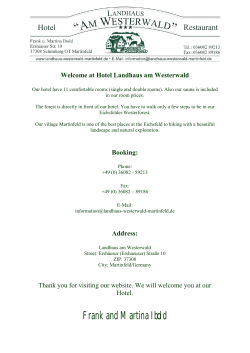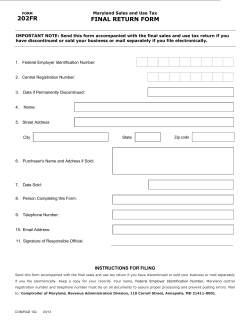
SB 190 imposes a new tax on Maryland citizens Nearly
NetChoice Promoting Convenience, Choice, and Commerce on The Net Carl Szabo, Policy Counsel 1401 K St NW, Suite 502 Washington, DC 20005 202-‐420-‐7485 www.netchoice.org April 17, 2015 Governor Larry Hogan 100 State Circle Annapolis, MD 21401 RE: Opposition to SB 190 – Creating a New Tax on Maryland Travelers Dear Governor Hogan: Your campaign focused on curtailing the scope and size of Maryland taxes. To that end, we ask you to veto SB 190 as it imposes a new tax on the fees travel agents charge for researching, comparing, and booking rooms for travelers. Cities and states favor hotel taxes since they fall mostly on visitors – not on resident voters. But under SB 190, this approach would backfire since the new service tax would be paid only by Maryland citizens – not by travelers from out-‐of-‐state. And the tax would only impact Maryland businesses like wedding and convention planners. SB 190 imposes a new tax on Maryland citizens Today, Maryland does not impose sales tax or lodging tax on service fees charged by travel agents. These service fees compensate travel agents for researching and comparing available hotel options, booking the room, and handling payment to the hotel. SB 190 would impose a new tax on these service fees provided by travel agents and online travel companies, a tax that is passed on to your constituents. Nearly all travel agents and travelers rely upon online services to research, compare, and book reservations From our work on this issue in states and at NCSL, it’s clear there is some misunderstanding about travel reservation services and taxes. The chart below shows the flow of services, taxes, and payments in a typical transaction where a traveler uses a travel agent or online travel company to research and book a hotel reservation. As shown in the chart, travel agents and online travel companies are providing a service to travelers. These services include comparisons of rates and amenities at multiple hotels, plus facilitation in making the reservation, processing the payment, and sending charges and applicable taxes to the hotel operator. Clearly, this facilitation service is distinct from the room provided by the hotel where the traveler eventually stays. Travel Intermediary PAYMENT $ Hotel Room Charge + Anticipated applicable taxes + Compensation for Services INVOICE $ Room Charge + Applicable Taxes = Total Payment = Total Invoice SERVICE Facilitating selection, booking, and payment PAYMENT $ Room Charge + Applicable taxes = Total Payment ACCOMMODATION Hotel provides room to traveler Services model: MTC proposal: SB 190 allows tax cand ollectors to levy their occupancy t ax n more ust hotel rooms Tax service accommodation separately. Taxo service as partthan of the jaccommodation. Source to where customer receives the service. Source everything to the hotel location. Maryland travel agents routinely create packages that bundle hotel rooms, food, travel, and events into one price. SB 190 allows Baltimore tax collectors to impose their occupancy taxes on all kinds of goods and services when included in travel packages: • taxi from the airport to the hotel • food served at a hotel restaurant • tickets to the Maryland Science Center • guided tour of the Inner Harbor • wine tastings SB 190’s new tax on travel service fees would only apply when Maryland citizens book their travel The new tax imposed on booking service fees by SB 190 would impact only Maryland’s citizens and businesses. That’s because of the Maryland sourcing rules for determining the source jurisdiction for taxable services – when a tourist uses a travel service, the reservation service fee is sourced to the traveler’s home location – not to the traveler’s destination. “gross receipts from contracting or service-‐related activities shall be included in the numerator if 1 the receipts are derived from customers within the state of [Maryland]” 1 MD. REGS. CODE § 03.04.03.08.C.(3)(c) (emphasis added). 2 For example, say two tourists are booking a hotel room in Maryland. One lives in Pennsylvania, the other in Annapolis. The Pennsylvania tourist would not pay the tax created by SB 190 when they booked through a travel agent since they received their online booking services outside of Maryland.2 But, the tourist living in Annapolis who books through a travel agent would pay the tax created by SB 190. This new tax would therefore only apply to services provided to Maryland-‐based travelers. The tax would not apply to service fees paid by out-‐of-‐state travelers booking Maryland hotels. SB 190’s new tax on service fees would only be collected by Maryland-‐based travel agents and Maryland-‐based travel websites The requirement to collect SB 190’s new tax on booking services could only be enforced against travel agents and websites that have a physical presence in Maryland. As noted above, out-‐of-‐state travel agents and websites already collect and remit lodging taxes when they make payment to the Maryland hotel operator. But out-‐of-‐state travel agents would not be required to collect this new tax on service fees for providing reservation services at the time that travelers book their hotel. To consider another example, say that a West Virginia tourist uses a West Virginia travel agent to book a Maryland hotel room. West Virginia already taxes travel agent service fees provided to state residents receiving the service at their home location. So any West Virginia-‐based travel agent or website is already collecting sales tax on the service fee when booking West Virginia travelers at Maryland hotels. In fact, SB 190’s new tax would attempt to impose double taxation of the same service fee paid by this West Virginia tourist, which was probably not the intention of the bill’s authors. Please remember that SB 190 would impose new taxes only on Maryland citizens, while placing your in-‐ state travel services at a competitive disadvantage to out-‐of-‐state rivals. SB 190 imposes new tax collection costs on small travel agents If a small travel agent books only one trip for a customer to Maryland, that travel agent must now fill out tax forms for the state and local jurisdiction. A Price Waterhouse Coopers study found that small retailers under $1 million in revenue, already incur 3 17 cents for every sales tax dollar they collect. For small travel agents the costs can be even higher due to the complexities of the travel based sales taxes. We ask you to not impose these new costs on Maryland travel agents. Minimal revenue generated For reasons explained above, every state, city, and county that has enacted a similar new tax has failed to gain the anticipated tax revenue. First, as discussed above, because of the sourcing law in Maryland, the service taxes could not be imposed on any out-‐of-‐state traveler. Second, Maryland tax collectors do not have authority to force out-‐of-‐state travel agents to collect these new service taxes since states can only impose collection obligations on businesses with a physical presence. 2 3 Note that the out-‐of-‐state tourist still pays the Maryland occupancy tax when they book the room. Available at http://www.netchoice.org/wp-‐content/uploads/cost-‐of-‐collection-‐study-‐sstp.pdf. 3 So when you consider this tax, please consider whether the minimal tax revenue is worth the harm to Maryland’s travel agencies and travel websites. We appreciate your consideration of our views, and please let me know if I can provide further information. Sincerely, Carl Szabo Policy Counsel, NetChoice NetChoice is a trade association of e-‐Commerce and online businesses. www.netchoice.org 4
© Copyright 2025









